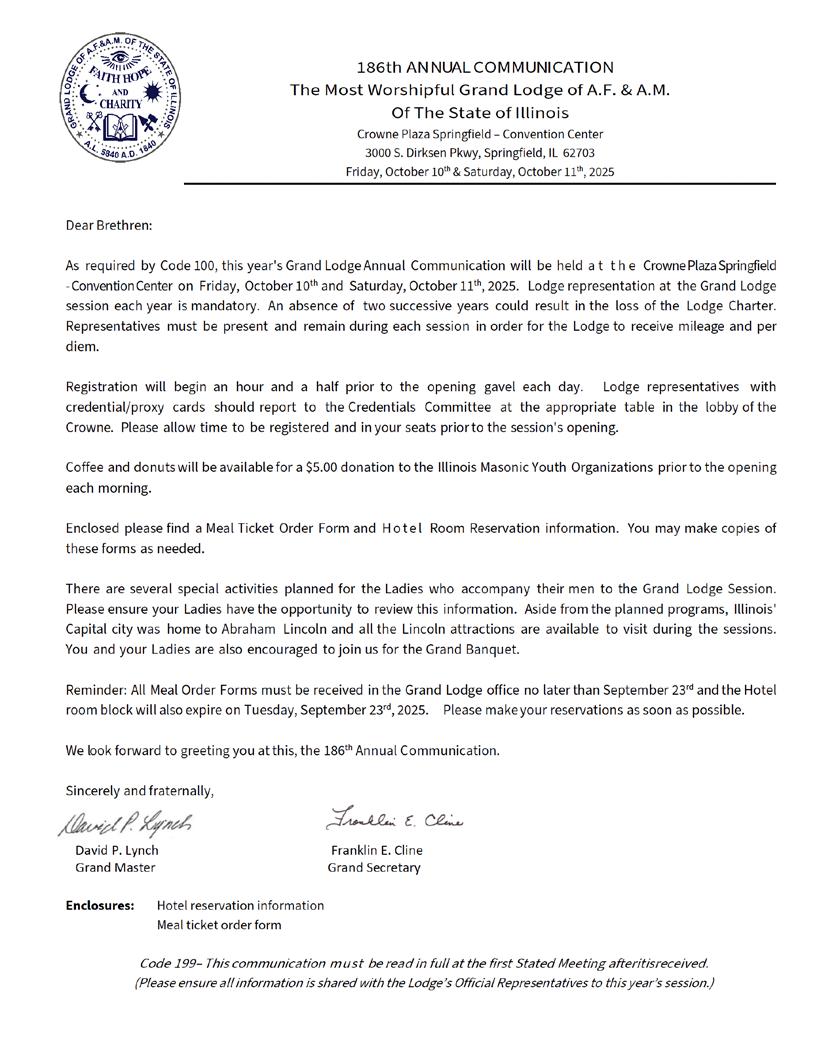The Lyceum
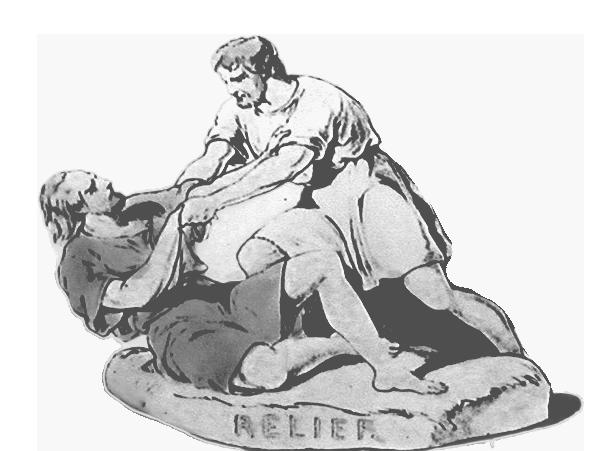
A Publication of The Committee on Masonic Education
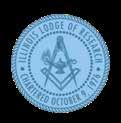
RW:. Chad M. Lacek, 33˚
WB:. Steven L. Harrison, FMLOR, 33˚
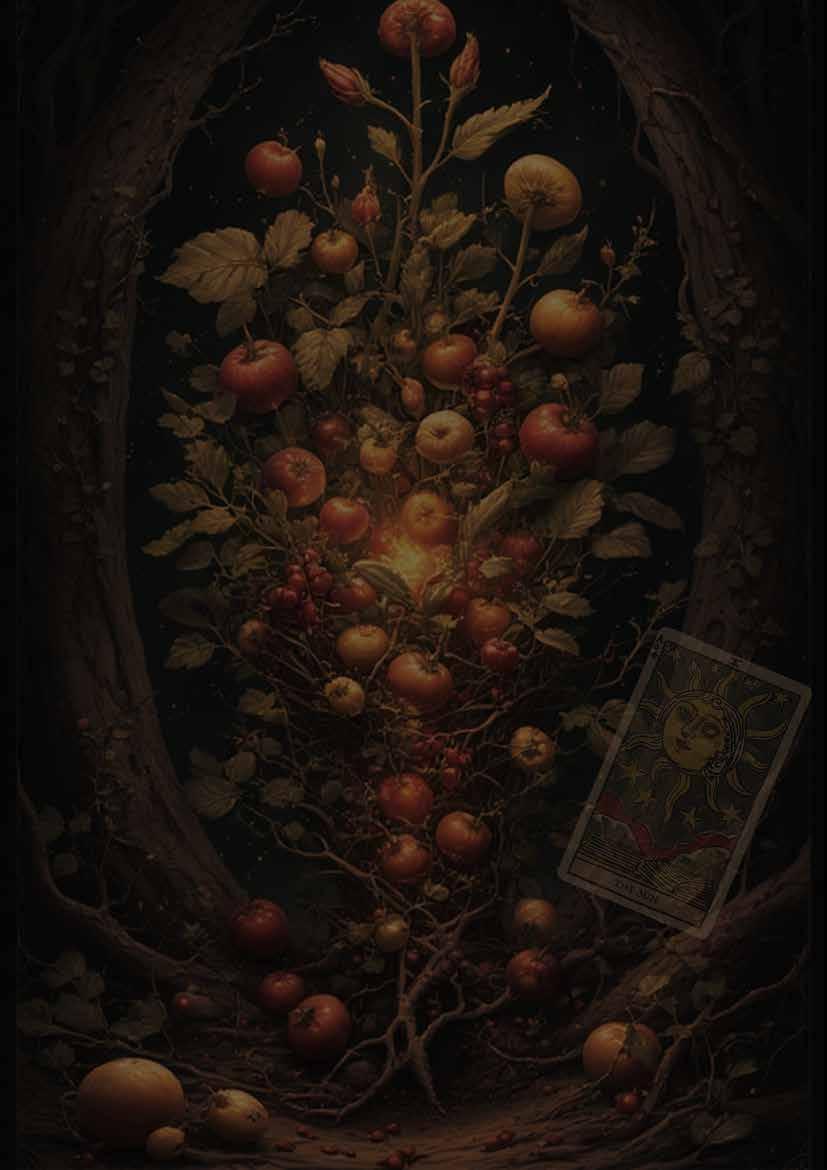





RW:. Chad M. Lacek, 33˚
WB:. Steven L. Harrison, FMLOR, 33˚



Dear Brothers,
As we gather in virtual Brotherhood once more, it is with great pleasure that I introduce the July/August issue of The Lyceum, the official Masonic Education magazine brought to you by the Grand Lodge of Illinois. During this season, we reflect deeply on one of the core tenets sustaining our divine Brotherly array: Relief.
Our Masonic journey has always been anchored in the noble pursuit of providing support where it is most needed—an eternal pledge to be a source of light and help. This issue focuses on “Relief,” exploring how this bedrock principle fortifies our fraternal purpose and was crafted to inspire your daily acts of kindness toward others within our gentle craft.
We begin our enlightening journey with an address by WB Dr. Bernard Davis Jr., the Chairman of Masonic Education for the Grand Lodge of Illinois, whose words offer profound insight into how Relief manifests as a vital aspect of our organizational ethos.
Bro. Jesus Hernandez of Oregon continues with “The Principal Tenets of Freemasonry: Relief,” illuminating exactly what Masonic Relief is. Following that, Bro. Erik Marks, MA, provides a soulful exploration in “In Darkness Wishing for Light,” reminding us that even the smallest gestures can serve as beacons of hope—and to keep an ever watchful eye on our Brothers who may be in need.
The Committee on Masonic Education of Illinois shares practical observations in “IMOS - Relief in Action,” demonstrating how our collective efforts bring tangible aid to our communities. The “Encyclopedia Masonica” further distills the concept with “Relief Defined,” a thorough their official definition of this core concept.
“Relief is Brotherly Love in Action” by Darin A. Lahners explores one lodge’s story and what happens when relief is ostensibly rejected. In “Whence Comes Relief?” Chad M. Lacek offers deep insights by probing the very depths of our consciousness—are you ready to ask some serious questions of yourself?
Steven L. Harrison delivers an engaging narrative in “The Rite of Destitution - That Hopeless Feeling,” which probes the potential responders’ feelings in moments requiring relief. It will have you reminiscing!
As we peruse the archives with “From the Archives: The Freemasons Chronicle 1886,” we’ll see the beginnings of organized Masonic Relief that very well may have laid a foundation for what exists today.
Finally, don’t miss the “Grand Lodge Important Dates & Conferences” for upcoming events that enable us to connect, learn, and propagate the spirit of Relief through fellowship and continuous education.
As you journey through this issue, may you find aspirations and encouragement to embody Relief in every sense. Let these insights bolster our shared resolve to practice the values we cherish.
Fraternally yours,
R.H. Johnson,

Editor-In-Chief
The Lyceum
The Grand Lodge of Illinois

by WB:. Dr. Bernard Davis Jr., Chairman- Masonic Education Committee

In this month’s Lyceum, we turn our focus to *Relief*, the second principal tenet of our Masonic foundation. Within the context of Masonic education, Relief is not merely about charitable giving—it is about cultivating a mindset of support, stewardship, and intellectual compassion.
Relief, at its core, is an act of understanding. It asks us not only to offer help, but to be educated in the needs of others—to listen, to discern, and to respond with wisdom. In this way, education becomes a tool of Relief. The more we learn, the better equipped we are to relieve others of their burdens, ignorance, and isolation.
Through the study of our rituals, lectures, and historical traditions, we gain insight into what it truly means to be a Brother in both spirit and deed. Relief challenges us to apply our knowledge with intention—to serve as mentors, to share our experiences, and to uplift others intellectually and spiritually.
As Masons, we must also reflect on the ways in which Relief is reciprocal. Are we providing opportunities for newer Brothers to grow? Are our lodges fostering a culture of continuous learning and accessible wisdom? True Relief is the creation of spaces where knowledge flows freely, and each Brother is empowered to seek and share light.
Let this edition of the Lyceum spark not only generosity in action, but generosity in thought. Let us relieve one another of doubt, confusion, and silence—by teaching, learning, and growing together. Fraternally,
Dr. Bernard Davis Jr,
WB Dr. Bernard Davis Jr, Chairman - Committee on Masonic Education Grand Lodge of the State of Illinois

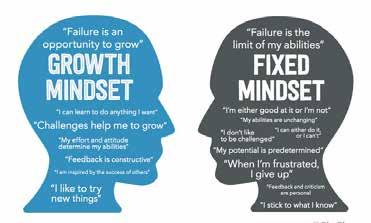
by Jesus Hernandez, Eugene Masonic Lodge No. 11, OR
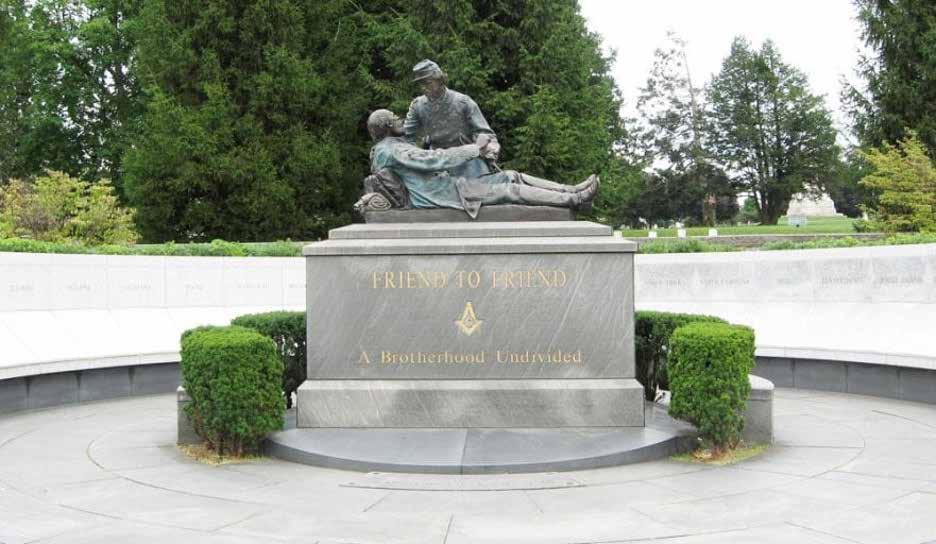
Relief is thought of most commonly as a form of charity, but Masonic relief has yet another meaning. A person may be distressed in many ways other than financial. He may have a business or a family problem that is discouraging to him, and a helpful suggestion may give him the relief he needs. He may be lonely because he lacks proper associations; then a cheerful word may be the relief he seeks. We claim that there are many ways of giving relief, and to relieve the distressed is a duty incumbent on all men. To sympathize with their misfortunes, to console them in their sorrows, and to restore peace to their troubled minds, these are the great aims we have in view. We as Masons must be alert to recognize these opportunities and offer our services in the way that will best bring relief.

Does the Friend to a Friend Monument stir up questions about the true stories of Brotherhood in the Civil War? Check out the amazing book:

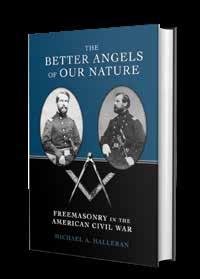
by Bro Erik Marks MA
*Disclaimer: The following article cannot be used to diagnose or treat any condition, nor is it intended to imply, impart, or provide a clinical training process or be a substitute for professional care.*
In darkness, wishing for Light: expanding the definition of Masonic Relief. Erik Antony Marks, 32, LICSW (Originally published in a modified form in the Fall 2018 issue of Trowel Magazine for Massachusetts Masons: http://tiny.cc/TrowelMagazine).
Brethren, when we first kneel at the Altar of Freemasonry, we acknowledge we are in darkness. Ignorant to the teachings of this Gentle Craft, we supplicate the Worshipful Master and Brethren to aid our Psycho-Spiritual development by providing Light in and through Freemasonry. At other times in our journeys, we may know we are in a different kind of darkness, though perhaps uncertain as to how that darkness descended. As the rough ashlar, no person is immune to the ruffians of the mind and spirit, the mental or emotional afflictions of life: anxiety, depression, shame, trauma(s), substance abuse, loss, existential crises or those of faith, financial or relational distress can affect any of us, at any time. Any one of us may be experiencing these presently or know others who are or have.
Within Freemasonry, the Charity and Relief we hold dear affirms to our Brothers there is always hope; that help awaits. I propose we support each other by providing a non-monetary, and possibly far more enduring, form of relief. Through discussion, education, and support about emotional and psychological distress it is my hope we will co-create stronger light to shine into the lives of our Brothers, their families, and our communities. To be clear: This missive has multiple purposes, 1) proposing an expansion the definition of what we consider charity or relief; 2) to help one another recognize signs emotional and mental health distress that manifest as part of our humanness and how to help by talking about these openly; 3) as a starting point to look for resources to
be of assistance to those in need and 4) to identify when a Brother, Family Member, or Member of our Community may be at risk for death by suicide and direct them towards help. Approximately 45,000 people died by suicide in 2016 and is the fourth leading cause of death in the United States according to The National Institute for Mental Health. According to the Centers for Disease Control, rates are rising and offered this Technical Package on Suicide Prevention. I have heard it said suicide, a public health epidemic, is one of the most preventable.
We are in a unique position to fulfill one of our primary missions and assist in prevention by sharing and expanding upon about what follows.
In Masonry we build, with ancient tools and modes of recognition, a trust and bond sufficiently solid to offer a strong grip to our brothers in distress. We could endeavor to lift (br)others back to the possibility of Light, so they, and we, may enjoy greater ease and efficacy in daily life. In the discharge of our obligation of relief to one another, I think it is essential to develop fluency in this conversation. The more we practice the words and phrases, the easier they become to perform. Consider these starting points toward an expand use of our tools:
First, gather information and have a plan. Notice changes in someone’s behavior and routine. Some changes or states may be obvious, some may be subtle depending on the person. It is more important to notice and respond than to try to figure out the reason someone is in darkness: a diagnosis or label is unnecessary for the provision of relief. In this expanded form of relief, our perception or notice of changes in their mood or behavior is the other’s “application,” to us for relief. Look for any of the following changes in (but not limited to): very high or low mood, sleeping too much or too little, appetite increase or decrease, isolation, irritability, too little or much energy, loss of interest in many or previously cherished things or activities, increased substance use, reckless behavior, statements of hopelessness or giving up.
Second, respond. One of the greatest gifts we can give is to listen deeply and attentively; one of the most valuable resources we provide is our time. Actively listen by making eye contact, emphasize phrases they use, ask for clarification, and paraphrase to confirm understanding. It is better to engage not knowing what to do than to not reach for the person at all. If you worry the person is such distress, they could be having thoughts of suicide, it is probable they already are and therefore essential to ask. Inquiring will not put the idea in their minds. To the contrary, knowing you are willing to say the words and ask the question signals to the person that you care enough to step into darkness with them and seek Light, together. It exemplifies, though word and action, that you have done your work to meet them on the five points: walk to where the person is, emotionally and/or physically. Steady their gait with yours. Stay in contact using beauty of your authentic words and the strength of an open Heart. Then…speak the word(s).
I’m allowing you to attach each point without saying them outright. Statements are sometimes made by people in distress that they or those around them might be “...better off if I was gone” or dead. This kind of statement, even if made “as a joke,” must always be taken seriously. Sometimes people will let such statements accidentally or unconsciously slip out and can be an opportunity to ask more. Other times, it is a direct request for help: our inquiry about what they feel and what they mean may not come in the public moment they make the statement, it may be prudent to step aside to inquire in a low breath. Asking in private increases the probability the person will feel comfortable and take your intention of care to heart. Though we are sworn to secrecy with regard to modes of recognition, do not let yourself be sworn to secrecy with regard to this information!
It may feel strange or uncomfortable at first, to ask about things more personal and private. Yet, we already have a method for this type of catechism. However, in this conversation, only our part may be practiced, the responses will be as unique and varied as each individual. Practicing with a brother or brothers before the words are needed, trading parts, will help with fluency, authenticity, integration, and ability to stay present when it counts:
“Hey, haven’t seen you in a while…could we get together this week?
“I’ve noticed you’ve seemed down lately…how’s it going?
“I get the sense something is really bothering you…”
“On the third…what’s going on?”
“Sometimes, when people are feeling what you’re describing, they can also feel hopeless, like giving up. Sometimes the idea of dying crosses their minds. Are you having thoughts like that?”
If there are clear signs or statements of imminent threat to self or other, calling 911 is appropriate and caring.
Third, stay in contact and begin to seek more help using the following tools and ideas. Connecting with others and/or getting back to Lodge, Lodge of Instruction, other Fraternal events could be a good start. Share a meal, at home or out. Scaffolding the person and sharing the work with other Brothers lightens each individual’s labor. Psychotherapy or counseling are effective ways to address many of life’s challenges—though I think of the two as different, for the present purpose they can be used interchangeably as many people use them that way already. The premise behind this tool is to have a consultant who is practiced in addressing the complexity of how thoughts, emotions, and relationships can become painful or debilitating. With the therapist/counselor, two people pool their life experiences and expertise to consider how to improve things for the one seeking assistance. It’s a protected conversation to allow for more self-exploration and developing more personalized tools to help oneself. For some, clergy trained in a similar manner may be a more comfortable path to find assistance. A useful on-line resource to begin the search for a psychotherapist/counselor is: https://www.psychologytoday.com/us/therapists.
(Disclosure: I have no financial interest in this resource and am not listed as a provider on the site).
Medicine is a tool to be used in conjunction with psychotherapy or counseling. Many find that a combination of both simultaneously has the best outcomes depending on the presenting problem(s). Unless clearly indicated, I usually start without medicine and encourage people to introduce it when all other avenues are exhausted or if the person makes the request at the start or along the way. Some people prefer to start with medicine rather than talking. Psychiatrists or Nurse practitioners who specialize in mental health issues are the preferred
provider. Alternately, many primary care providers now have experience prescribing medicine for anxiety or depression, and the pre-existing relationship may make it easier to start with this person; the primary care physician can also facilitate a referral if needed or recommended. Exercise and mindfulness-meditation are excellent self-interventions with little to no start-up cost and can be especially potent when enjoyed with a family member or Brother. There are numerous on-line or on-phone apps or resources with which to experiment to move towards healing. I’ve known people who have used a variety of alternative or adjunctive methods to help with symptoms or changes in mood—though beyond the scope of this article.
As Masons, we labor to manifest Charity through Brotherly love and affection. Reaching into the darkness to offer companionship and light might be one of the most powerful expressions of Relief we have to offer. Who would not come to the aid of a Brother? Not letting him sit alone at lodge is analogous to not letting him sit in the metaphorical north of his inner lodge or temple. If we suspect or notice distress and know that stepping into darkness is further than our cable tow will allow, we communicate, alert other brothers, family members, and/or professionals who may have resources of time, means, or experience to respond. I encourage commitment to having this conversation with one another in an ongoing way to extend how think of what is Charitable.
We can exchange information and experience about the previously secretive topics of emotional and mental health throughout our jurisdictions in the service of greater relief. I have faith that we can work together to build a stronger structure from which to shine The Light for our Brothers and Communities.

988
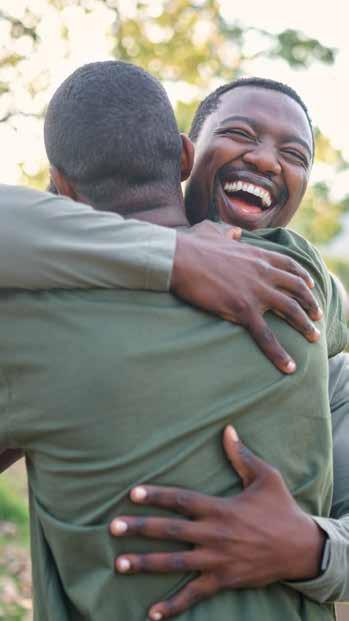

The Illinois Masonic Outreach Services (IMOS) Program is an Illinois Masonic Charity and affiliated with the Grand Lodge of Illinois A. F. & A. M.
• Must be an Illinois Master Mason in continuous good standing for a period of no less than five (5) years, Spouse, or Widow of a Master Mason.
• Must demonstrate financial need.
• Persons of any age can apply (with further consideration given to unforeseen or undue hardships).
As an example of IMOS’s work, watch Brother Mac’s story.
Our program strives to make personal, memorable connections with our applicants, in hopes that they feel comfortable continuing to come forward with any future needs. IMOS is known for its “caring” approachwe show true, genuine, and continual support.
Information, Advocacy, And Referral Assistance
How does it work? When an application is made, an IMOS case manager conducts a site visit or, in most situations, a phone assessment to collect functional, environmental, psychosocial, financial, employment, housing, educational, and health information as appropriate in order to complete a comprehensive financial and other needs assessment (all with absolute confidentiality).
The purpose of an assessment is to better understand
a person’s individual situation to determine if financial assistance can be provided. A review of all supporting financial documentation of a person’s assets, income, and expenses is completed.
Additionally, IMOS staff listens and identifies the specific needs of the individual and assists in the process of providing resource and referral assistance in connecting applicants to state, federal, and local benefit programs that they may qualify for. Per our compliance policy, applicants are expected to take advantage and apply for all areas of assistance they are eligible for.
IMOS staff can also advocate on the members’ behalf; such as negotiating a lower bill with a hospital, dental clinic, or medical facility. IMOS staff expand and build their education and knowledge continuously by attending conferences, workshops, and webinars, and visiting local departments that provide these types of resources (to remain current on changing trends and services offered).
Our program strives to make personal, memorable connections with our applicants, in hopes that they feel comfortable continuing to come forward with any future needs. IMOS is known for its “caring” approachwe show true, genuine, and continual support.
Information, Advocacy, And Referral Assistance
How does it work? When an application is made, an IMOS case manager conducts a site visit or, in most situations, a phone assessment to collect functional, environmental, psychosocial, financial, employment, hous-
ing, educational, and health information as appropriate in order to complete a comprehensive financial and other needs assessment (all with absolute confidentiality). The purpose of an assessment is to better understand a person’s individual situation to determine if financial assistance can be provided. A review of all supporting financial documentation of a person’s assets, income, and expenses is completed.
Additionally, IMOS staff listens and identifies the specific needs of the individual and assists in the process of providing resource and referral assistance in connecting applicants to state, federal, and local benefit programs that they may qualify for. Per our compliance policy, applicants are expected to take advantage and apply for all areas of assistance they are eligible for.
IMOS staff can also advocate on the members’ behalf; such as negotiating a lower bill with a hospital, dental clinic, or medical facility. IMOS staff expand and build their education and knowledge continuously by attending conferences, workshops, and webinars, and visiting local departments that provide these types of resources (to remain current on changing trends and services offered).
IllinoisMasonicOutreach.org
Freemasonry is built on the values of brotherhood, compassion, and service. For Illinois Masons facing unexpected hardships, the Grand Lodge of Illinois A.F. & A.M. charities, including the Illinois Masonic Outreach Services (IMOS), Illinois Masonic Student Assistance Program (IMSAP), and the Illinois Masonic Children’s Assistance Program (IMCAP), provide a crucial lifeline. Whether it’s assistance with essential expenses, support for growing families, or relief during difficult times, these programs ensure that no Illinois Mason stands alone in their time of need.
Below, Masons and community members share their personal experiences with the Grand Lodge of Illinois charities. Read on for their stories of resilience, gratitude, and the power of Masonic support.
My wife and I were hit with an $18,900 sewer bill—something we could never afford. I’m 81, and she’ll be 80 soon. We live on Social Security, and while we try to make ends meet with some DoorDash deliveries, that kind of money just wasn’t possible for us.
Desperate for help, I reached out to my local Scottish Rite Valley. They sent us $500 right away. Later, the Grand Lodge of Illinois, A.F. & A.M. got us in touch with IMOS. They asked what money we had saved to go towards the bill – we had $2,040. After a few phone conversations back and forth, they decided to cover the rest of the balance. It felt like something out of a movie, something that doesn’t happen in real life.
I can’t even put into words how grateful we are. Heather and Jennifer, the two ladies from IMOS who helped us, are two of the kindest people I’ve ever spoken to. We’ve never met in person, but if I ever do, I told them I’d give them an air hug. They are beyond amazing. If I could, I’d send them flowers, but usually, I only send those to my wife - we’ve been married for 60 years!
This year marks my 52nd anniversary as a member of the Masonic Lodge. I’ve been a 32° Scottish Rite Mason in Jonesborough for four or five years, and I’m part of the York Rite as well. Freemasonry has always been a big part of my life.
I always wear my 3° ring and 33° rings, and on Sundays, I wear my father’s 32° ring. He and I worked together for 25 years, and he was also a Freemason. If anyone ever asks about my rings, I’m more than happy to talk about them—I could talk about Freemasonry all day.
I never imagined when I joined that I’d still be here 50 years later. What IMOS did for us proves what this fraternity is about—brotherhood, kindness, and support when it matters most. I think about them constantly. They got us out of an impossible situation, and I can’t say enough about what that means to us.
Just the other day, I was at the barbershop and left a Shriners book there. If anyone seemed interested, I told them to call. I want others to know about the kind of people we have in this fraternity. It truly is unbelievable.
I was in a tough financial spot—struggling to keep up with expenses, take care of the kids, and cover the bills. It was getting harder and harder to manage. One day, I was talking to a Mason friend about everything I was dealing with, and they told me about IMOS and IMCAP.
The support they provided made a huge difference. They helped with financial stress, covered essential bills, and made sure my kids had clothes for every season - spring, fall, and winter. Kids grow fast, and that kind of help was invaluable. They also helped with food and other necessities. Without their support, I don’t know how we
would have managed. My Social Security is only $900 a month, and just my car and insurance alone eat that up. A picture taken from behind of a man in a motorcycle vest that reads “Illinois Masonic Riders ASSN”
Brother Phillips wearing his Illinois Masonic Riders vest Two men on stage during a Masonic ceremony, one in a ceremonial Masonic apron and the other in a white Masonic apron. Brother Phillips becomes the first Black Mason to join Mattoon Lodge No. 260.
I’ve been a Mason for 19 years - 20 this August. My journey started back when I was 16 in Mississippi, where I joined a Junior Mason program. That gave me the chance to visit a lodge and see what Masonry was all about. When I moved to Illinois, I became a Mason myself. Now, I’m a 32° Scottish Rite Mason, a member of Eastern Star, a Shriner, and even a member of the Ancient and Honorable Order of Turtles.
Before all this, I didn’t know IMOS and IMCAP provided this kind of help. I had no idea they did so much for Masons in need. Whether it was Sue or someone else who first helped me get connected, I’m beyond grateful. Their support has given me the stability to manage things a lot better now.
Kelly West
The Illinois Masonic Student Assistance Program (IMSAP) has consistently demonstrated its commitment to enhancing the professional development of our districts through its exceptional workshops. These sessions, offered to both certified and non-certified staff as well as administrators, have been invaluable in equipping educators with practical strategies and resources. The presenters, all current practitioners in the education field, bring real-world experience that resonates with participants.
A teaching workshop where a group of people are seated at tables and working on training materials
An IMSAP training at Dr. Kelly West’s school Feedback from attendees has been overwhelmingly positive, with many expressing a desire for longer sessions to fully absorb the wealth of knowledge shared. Evaluations often highlight the practical nature of the workshops, noting that the strategies presented are immediately applicable in the classroom. IMSAP’s dedication to providing high-quality, relevant professional development continues to make a profound impact on our educational community.

One of the three principal tenets of a Freemason’s profession, and thus defined in the lecture of the First Degree:
To relieve the distressed is a duty incumbent on all men, but particularly on Freemasons, who are linked together by an indissoluble chain of sincere affection. To soothe the unhappy, to sympathize with their misfortunes, to compassionate their miseries, and to restore peace to their troubled minds, is the great aim we have in view. On this basis we form our friendships and establish our connections.
Of the three tenets of a Freemason’s profession, which are Brotherly Love, Relief, and Truth, it may be said that Truth is the Column of Wisdom, whose rays penetrate and enlighten the inmost recesses of our Lodge; Brotherly Love, the Column of Strength, which binds us as one family in the indissoluble bond of fraternal affection; and Relief, the Column of Beauty, whose ornaments, more precious than the lilies and pomegranates that adorned the pillars of the porch, are the widow’s tear of joy and the orphan’s prayer of gratitude.


The Masonic Restoration Foundation Symposium is the largest gathering of Masons in North America who are expressly committed to observing the highest standards of excellence in the Craft. This year, for only the second time, we are returning to Canada, to one of the most majestic Masonic locations in Canada: the Hamilton Scottish Rite Temple, in Hamilton, Ontario.
The Symposium will take place from August 15-17, 2025, and will be hosted by Templum Lucis Lodge No. 747.
As usual, the event will begin with a Harmony [Festive Board] held in the Lower Level Dining Room on Friday evening, conducted by the MRF Board, and featuring comments from our Keynote Speaker, WB Ric Berman, Past Master of the Quatuor Coronati Lodge No. 2076 in London, England. Along with our usual lineup of interesting speakers, brothers will have the opportunity to witness a Fellow Craft Degree conferred by Heredom Lodge No. 749 on Saturday afternoon. Registration for the Symposium is $125.00 USD/$175.00 CAD, and $75.00 USD/$100 CAD for the Saturday session only.
We are hoping that this year’s Symposium will be an opportunity for an exchange of different perspectives and methods of Masonic practice in North America, and one that will especially bring in brothers from across Canada. All the information you need to participate is found here on this web site. We look forward to seeing you at the Symposium!
Andrew Hammer President, MRF
The MRF Symposium is a meeting place for Masons who are seeking the highest form of Masonic experience they can attain within their lodges, while strictly conforming to the laws, resolutions, and edicts of their respective grand lodges. It is a gathering for those who pursue quality in the Craft to share ideas and discuss their work. The Symposium begins on Friday evening at 7:30 PM, with a Harmony in the Lower Level Dining Room, and concludes before noon on Sunday. As always, we have assembled an excellent program of speakers and presenters to share their light with you.
Any Mason in good standing may register for the Symposium, provided he is a member of a Grand Lodge which is a member of, or is recognized by any one of the Grand Lodges which are members of, the Conference of Grand Masters of North America, or the United Grand Lodge of England, the Grand Lodge of Ireland, or the Grand Lodge of Scotland. Full Registration for the Symposium is $175 CAD/$125 USD.
Topics
- Origins, Allegory, and Enlightenment: From the Horn Tavern to Solomon’s Temple
- Why Do We Bother?
- Dealing With Diversity in the Lodge
- Tragedies and Triumphs in a New Observant Lodge
- Living Life as an Observant Mason
- Victory Through Harmony: Transforming an Existing Lodge
- The Observant Lodge In Canada
- Happiness: The Chief Aim of Masonry
- Kipling, Burns, and Observant Masonry
Featured Speakers and Panelists:
Ric Berman . Ed Burridge . David Cameron
Donald Carducci . Jean-Frédéric Dicaire Philip Durell Dan Graham . Andrew Hammer
Chad M. Lacek

by WB:. Darin A. Lahners, FILOR, IL

I recently came into possession of some Lodge minute books for Newman Lodge No. 369 with the help of my good friend and brother, Greg Knott. Newman Lodge No. 369 merged long ago with Villa Grove Camargo Lodge No.885. As I flipped through the minutes, I came across two handwritten pages attached to the page for the lodge minutes for March 30, 1905. The pages were a committee report regarding their appointment to “confer with Brother O. (Oliver) C. Jones, a member of this lodge, about whom reports prejudicial to the character of a true and consistent mason have for sometime been in circulation to the effect that he is quite often under the influence of intoxicants to excess and also with neglecting and otherwise mistreating his wife.”
When the committee conferred with Brother Jones, they stated that, “he has freely and fully acknowledged and admitted their truthfulness and he seemed to be sorrowful and repentant over his repeated acts in marked violation of masonic teachings and obligations to his own shame and the injuring of his lodge and fraternity in general.”
The committee was, “glad to further report that the brother after this committee had fully explained to him the nature of these infractions of masonic requirements and of his liability to charges by his lodge for unmasonic conduct did pledge his word and sacred honor to ever here after, abstain from the vice of strong drink, and treat his family as a true husband and father should.” The committee “after due consideration of the matter
and with a strong desire to save the brother from going to the bad if possible would fraternally recommend that further action against the brother be suspended, and he be given an opportunity to redeem the pledges made to this committee.”
I remember remarking to Greg that I had a healthy amount of skepticism regarding Bro. Jones promises, and after reading further, I found another committee report. The report dated August 10, 1905 stated that: “It is with regret and sorrow that the committee is compelled to submit this, another report showing that the brother Jones has shamelessly broke the pledges made to this committee, and has been visibly drunk upon our streets, was arrested and fined for the offenses, and upon the refusal to pay same was imprisoned, thus bringing reproach upon the honored name of masonry and disgrace upon himself.” The report continued to state that: “in consideration of this fact, and the further fact that other like promises made by the brother in the past have been in like manner broken, your committee would recommend that charges be preferred against the brother for drunkenness, and he be cited for trial and dealt with as the lodge would determine.”
A masonic trial for O.C. Jones was held at a special communication on September 23rd, 1905. Brother Wm. M. Young, acting on behalf of the accused, asked for a continuance in the absence of Bro. O. C. Jones, the accused. The motion was not seconded and was overruled by the Worshipful Master on the grounds that the accused had been duly notified and had not
appeared, nor had he notified the lodge of his inability to appear. The trial then proceeded. Eleven brothers gave testimony that they had seen or heard of Brother Jones being drunk on or around the date of August 5, 1905. The most damning testimony being given by Bro. Fred White who was asked if he had seen Bro. Jones drunk recently, to which he replied: “I cannot remember the date, but he was so drunk he could hardly carry the mail.”
The minutes report that: “the question of innocence or guilt was submitted to the lodge and the voted resulted in 20 black and 4 white. It was therefore declared that Bro. O.C. Jones was guilty of drunkenness and conduct unbecoming a mason.” The ballot was then taken for penalty purposes of expulsion, indefinite suspension, definite suspension, or reprimand. The first ballots were not within the 2/3rd vote of the lodge for any of the above, so a second ballot was taken. At this time, 17 black and 7 white was cast for indefinite suspension, at which time the secretary was instructed to notify the brother and other lodges in the district of the indefinite suspension of Bro. Oliver C. Jones.
I wish there was a happy ending to the curious tale of Oliver C. Jones; but alas there is not. Greg found an entry on the “Find A Grave” website for Oliver. It reads:
The Indianapolis News (Indianapolis, Indiana) 30 Jan 1909, Sat, Page 12 Veteran Dies from Exposure. [Special to The Indianapolis News.]
NEWMAN, Ill., January 30.—The body of Oliver C. Jones, an aged veteran of the civil war, was brought here from the National Soldiers’ Home near Danville, Friday, for burial. He died from exposure when intoxicated Monday night.
We are taught in the Entered Apprentice Degree that: “To relieve the distressed is a duty incumbent on all men; but particularly on Masons, who profess to be linked together by an indissoluble chain of sincere affection. To soothe the unhappy, to sympathize with their misfortunes, to compassionate their miseries, and to restore peace to their troubled minds, is the grand aim we have in view. On this basis we form our friendships and establish our connections.”
We have all taken our obligations to aid and assist our brothers so far as our ability permits without material injury to ourselves, which is the modern definition of Charity. However, many Masons equate the Masonic
Grace of Charity with the Masonic tenet of Relief, as I explained in my previous Lyceum article, the passage in 1 Corinthians 13 in the KJV bible has Charity in place of the correct translation: Brotherly Love. Therefore, Relief is a verb which means: “Practicing Brotherly Love” or practicing empathy.
Sometimes, the simple act of reaching out to the brothers we’ve not seen at meetings as well as reaching out to our Masonic widows and orphans to check in on them is the most impactful action of relief that we as Masons can undertake. This is a duty that should be incumbent upon every Mason, yet as mentioned, it’s usually falling upon the officers of the lodge or a committee. From this action, it’s possible that we might learn that they need financial assistance, that they have been ill, or that they are distressed.
In the above case of Oliver Jones, we are left to ask ourselves if the brethren were practicing Brotherly love. Reading the reports and the minutes, I think that they did. I’m not sure what else the brethren of Newman lodge could have done. The committee approached the brother and whispered good counsel to try to keep the brother from further harm to himself and the fraternity. Oliver made promises that he would change, but being in the grasp of alcoholism, he was not able to.
The brethren of the lodge felt their hand forced into holding a masonic trial when the brother went back on his word to them and ended up getting himself arrested. In 1905, there were probably very few, if any, treatments for the Alcoholism. Alcoholics Anonymous would not be founded for another 30 years, and in 1905; it was not understood as a disease, but rather as a moral failing.
If Oliver lived today, and he were a member of your lodge, I can only imagine that you might do things differently. There might be opportunities to help get him into rehab before he ended up dying due to alcoholism. There might be other courses of action that could be taken, but without checking in on him, how would you know?
Following a lodge brother, widow or orphan on social media isn’t the same as putting in the sweat equity of calling up or visiting them. Social media is only ever going to show you a version of them that seems to be happy and content. Talking to them, especially face to face, will often allow you to pick up on the non-verbal queues that something might be wrong with that brother. It will allow you to practice Brotherly Love, to be able to show
and practice empathy towards them, and if needed allow you or your lodge to take further action to help them either financially or otherwise.
While we’re getting into the practice of brotherly love, let us also remember that brotherly love doesn’t mean that we should only practice it towards our brothers, but also towards all of mankind. Remember that when you represent the fraternity, that doesn’t end with the final gavel of your stated meeting. Being kind to a stranger might be the best marketing that Freemasonry can get. I think that Hebrews 13:2 says it best: Be not forgetful to entertain strangers: for thereby some have entertained angels unawares. May brotherly love prevail.



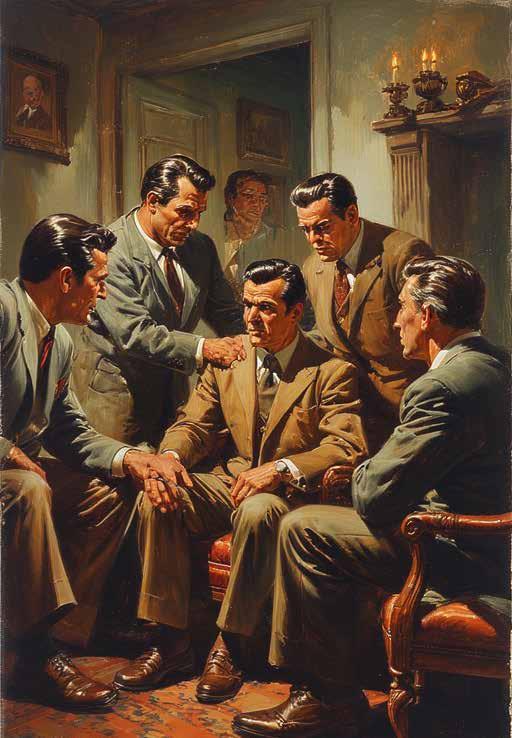
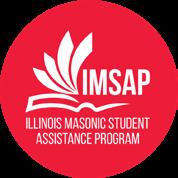




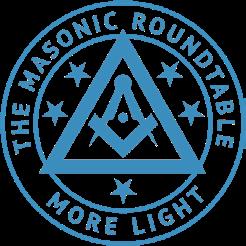

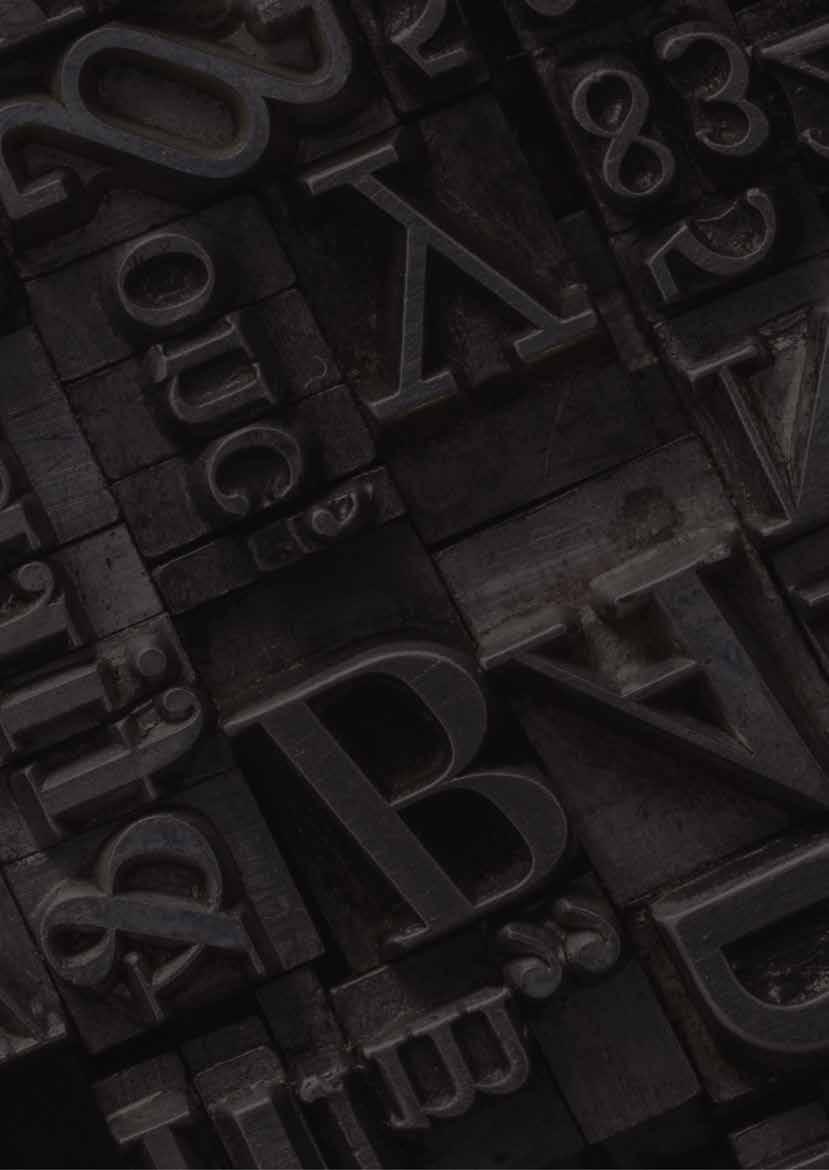
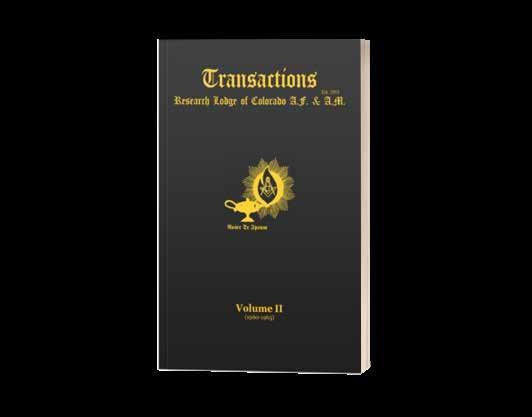
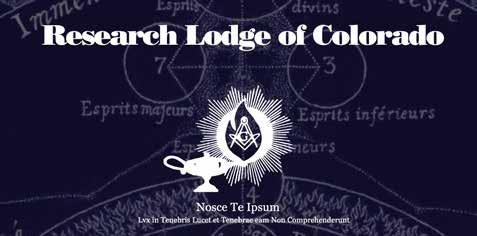
Since 1953, the Research Lodge of Colorado has been producing quality Masonic Education papers. Over the last three years, the Lodge has worked tirelessly to compile the transactions into an amazing volume that is beautifully curated and printed.

by RWB:. Chad M. Lacek, 33˚
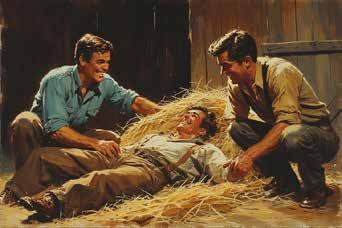
Many years ago, I befriended a rather old coworker. I liked to listen to the stories he would tell about life in rural Germany in the early 1900s. One such story was of a time when he had a small business concern, employing half a dozen men. He described holding a modest Christmas party for his workers. It conjured the Dickensian imagery of Old Fezziwig from A Christmas Carol.
This was not a lavish affair. A meager portion of food and a little drink, served in a barn after a long day’s work. Some tobacco was produced, and it was rolled into a cigarette using a scrap of newspaper. When one of his workers took a puff from this communal item, he fell to the ground in a swoon. My German friend hastened to the side of the afflicted man and held his head in his hands. The man’s eyes opened, and he said, “Master, I am in heaven.”
My heart sank. I was sickened when I heard this exclamation of ecstasy in my early 20’s. I imagined this man of middle age, who was so impressed with a free meal, a few sips of wine, and a single drag of tobacco rolled in a newspaper, that he toppled over in the height of his life’s pleasure. What a dreadful misery, I thought. This was the highlight of his life. His best experience. Imagine what his life had been--that this is now his fondest memory. I was heartbroken for him.
Now that I’m in my 50’s, I envy him. What would it take for you or me to collapse in all-consuming joy? Think of it. I can’t answer that question. I don’t think I’ve ever been that happy as an adult, and I don’t know what could ever make me feel that way now. Even if a dump truck full of money arrived in my
front yard, I wouldn’t lose my feet. Would you? There were moments in my childhood when I knew such happiness. It was so much easier to find joy then. To be that happy with such little provocation must be a blessing.
It occurs to me now that joy, satisfaction, gratitude, and peace of mind are all just that; they are of the mind. A wealthy person would observe my life and despair at how I could possibly manage to exist. Many of the world’s poor would view my life as the peak of luxury. How shall I view it? How should you view yours?
Our Masonic ritual seems to suggest that Relief is something that comes from without. We are extolled to soothe the unhappy, to sympathize with their misfortunes, to compassionate their miseries, and to restore peace to their troubled minds. Who decides what is unfortunate and troublesome? Most of us would be unhappy indeed if our employer provided the Christmas party I described. Yet we could just as easily be grateful for it. We get to decide.
I am at a point in life where the parents of my friends are reaching the ends of their lives. I’ve had the unpleasant duty of helping to clean out the homes of these good people, in preparation to sell them. We gather and dispose of items in a few hours which took a lifetime for them to collect. It’s common to hold an Estate Sale under these circumstances. It’s like a garage sale that encompasses the whole house.
About 20% of the items are sold. No one wants the rest, not even for free. Now we’re seeking dumpsters
to fill, or thrift shops that will do us the favor of unburdening us of these things. We spend our time, money, and effort gathering possessions that no one else wants. If they have so little value after we are gone, why should we attribute so much to them now?
If 80% of what you have was taken away, could you still find joy? I am not referring only to material possessions. Your health, your loved ones, your career, your opportunities, all of these are temporary. The Stoics are fond of reminding us that we should be grateful that we ever had these things when they are taken from us. We had the time and the joy, for as long as it lasted.
The need for relief seems inverse to resiliency. If we can practice gratitude and mindfulness on a daily basis, it will be much more difficult for us to become unhappy. We will view what others may call misfortunes as challenges. It will take a great deal more to trouble our minds. I’m not suggesting that we would be immune to sorrow, but I do believe that we can brace and strengthen ourselves. Imagine if we had the power to enjoy very little pleasures as though they were blessings. What if we could be half as happy as that German fellow with what we’ve been given? Hone this skill, and we will have come to our own Relief.

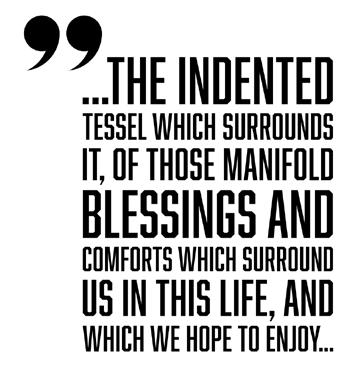
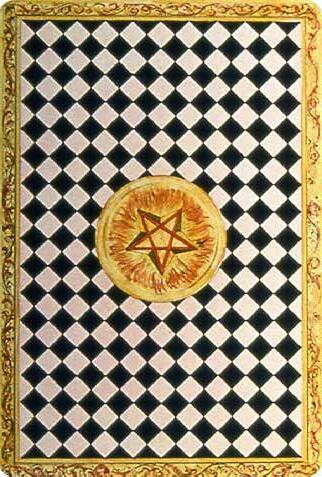
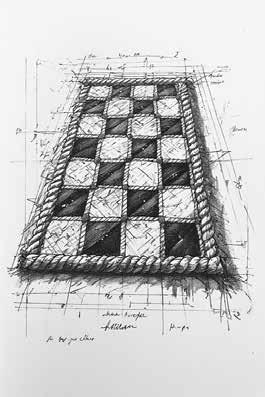
by Steven L. Harrison, FMLOR, 33˚
Think back to that day you became an Entered Apprentice. You had waited with patience – perhaps for months, perhaps not exactly so patient – for this big moment. You knew you had a long way to go in your journey, but you, the man they finally addressed as Brother, were now a Freemason. You stood before the Master of the Lodge among your Brothers, knowing you were a part of things… accepted… perhaps you even had a small sense of accomplishment.
Then, it all momentarily fell apart. You were asked for something you could not produce, and all of those warm, positive thoughts evaporated into a hopeless, empty feeling. You were the new guy.
You wanted nothing more than to please your new Brothers. You saw an empty hand stretched out. You wanted to comply. You couldn’t. Now what? Were they going to expel you for this? As your mind reeled, the Master explained what this was all about. You just received, in a graphic way, one of your first Masonic lessons.
Every Freemason, even if financially well-off, has for at least one fleeting moment known the despair of not having enough. That little object lesson, sometimes called the Rite of Destitution, certainly cannot compare to the reality of a life of grinding poverty, but the hope is it will teach you, the new Brother, that it is your duty – not your option, but your duty – to treat those in that condition fairly, to be able to empathize with them and, if at all possible, contribute to the relief of any such person “so far as his necessities may require and your ability will permit.”
Freemasonry being, as we are instructed, a progressive science, this is not the end of your lesson in charity. Elsewhere in our Masonic journey, we learn Relief is one of the great tenets of our craft. We in the United States and even the Western world are privileged in most cases to have the means to support ourselves and our families, but even here there are those who cannot do so. So we, as Freemasons, do what we can, both as Lodges and individuals.
It is a never-ending task. Jesus himself admonished us that, “the poor will always be with you.”
So undiscouraged, we remain aware that every little bit helps, and we never give up. Lodges, institutions, and persons of great means can – and do – make a significant difference with their contributions. The Shriners Hospitals, for example, have an immense impact on humanity with their charities and, with support, have the means to do it. We, as individuals and smaller Lodges, do not operate on the same level, but the spirit of our contributions is no less significant.
Most of our Brothers are individuals who would be generous to those less fortunate anyway, but it does not hurt to have that Rite of Destitution gnaw at us as a reminder that practicing the great tenet of Relief is the duty of every Freemason.


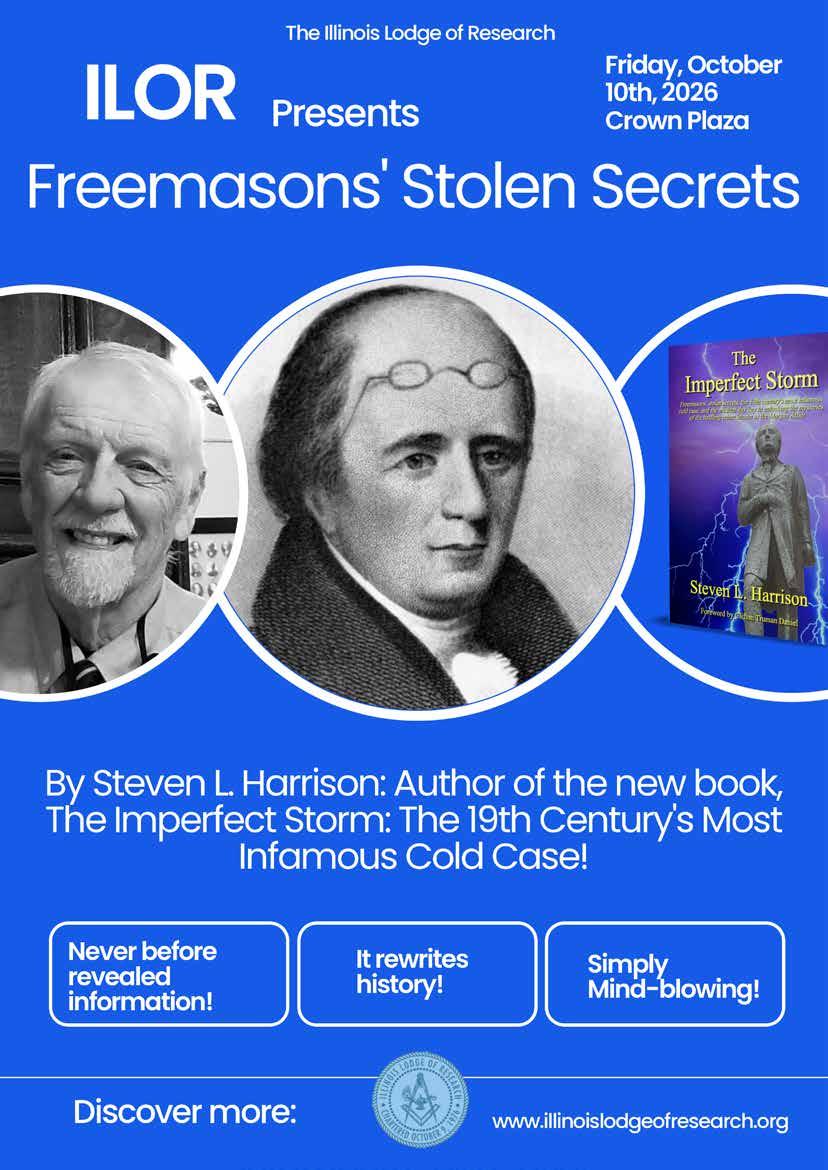
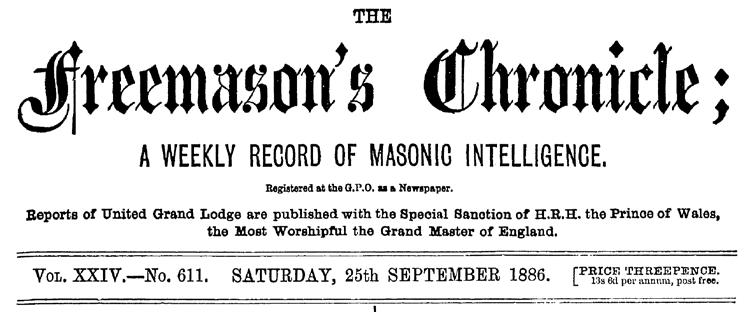
Notwithstanding the boasted benevolence of Freemasons, and the popular idea that members of the Order extend a helping hand to those of their number who may be in distress, we fear that in a large majority of cases it would go very hard with the Mason who found himself in a strange English town, penniless and in want. His case might bear the strictest investigation, his distress might have resulted from causes wholly beyond his control, and yet he would often find it a difficult task to obtain sufficient Masonic relief to keep him from suffering the pangs of hunger. The reason for this is not far to seek; it is not Freemasonry or its members as a body who are to be blamed, but the few black sheep who have found their way into the Masonic fold—men who do no work, and who never intend to, so long as they can eke out an existence by preying on their fellow creatures. These are the ones who stop the flow of Masonic benevolence, and make it hard for the truly deserving brother to obtain that which he is justly entitled to; for a Mason in distress is really entitled to such relief as his brethren are in a position to afford. While we recognize this as the true cause of Masonic hardheartedness, there is yet another fact which has to be taken into consideration; there are few towns which possess any organization intended to deal with appeals and cases of temporary distress. Were this the case the stranded brother would have a tribunal to which he could submit his appeal, and in instances such as we have referred to there would be a satisfactory response, costing the brethren of the town a mere trifle each, but proving of great service to the recipient. We ask our readers to imagine the position of a brother circumstanced
as we have surmised, who suddenly found himself in their midst. What could he do, to whom could he appeal , and what would be the reception accorded him? Provided he had no information as to Masonry in the town, he might visit two or three of the hotels before even discovering where a Lodge met, and when he had secured that information, he might find it impossible to ascertain the name of a single member. Supposing he was so far successful as to find himself in the presence of a brother, is it not more than likely he would be wrongly judged, or, at the most, he would be promised that his case should be considered at the next meeting of the Lodge. All this might be prevented if we had in each town a committee duly appointed to consider applications and afford relief on behalf of the Lodges they represented. It would be a hard matter to swindle these committees, as they would be in frequent communication with those in other towns, and thus they would serve a double purpose; they would check imposture and relieve real distress; that too at a cost far below what we are led to believe is annually expended on so-called Masonic impostors. A New York contemporary ably meets this question by giving a list of advantages which attach to a Masonic Board of Relief, and a brief perusal of the various items enumerated will no doubt prove interesting to our readers. A regularly constituted Board, says our contemporary, keeps applications away from the Lodges. This is an advantage which has much wider benefits than appears at first sight, for not only does a Board keep from the Lodge all those applicants which it feels justified in helping, as well as those which it deems unworthy of recognition, but it also proves the means of aiding others in such a way as to render their appeal
to a Lodge for pecuniary assistance unnecessary; this we shall show later on.
A Board has more time and better opportunities to investigate cases. This is perhaps the strongest argument that can be urged in favor of establishing Boards of Relief, for as we have said above, we consider it would be next to impossible for swindlers to deceive the brethren who constituted such Boards—at least to any great extent —because of the communication which would be kept up between the Boards of different towns. Further than this, some member or members of the Board would generally be in the district, and cases of distress could be considered at any moment, instead of being left over, as is often the case at present, until the next meeting of the Lodge. The delegates and Officers of a Board gain much experience and are therefore better qualified to judge as to the merits and needs of the cases, while on the discovery of an impostor, they publish the fact to the world at large. These are arguments which speak for themselves, this being more particularly the case in regard to the exposure of fraud, but the suggestion that familiarity with applicants places a man in a better position to judge what is right is also true and worthy of consideration. A Board assumes the responsibility of Masonic Charitable relief, and acts as the almoner of the Lodge contributing to it, at the same time reducing the actual cost of charitable disbursements to the minimum. And, our contemporary might have said, is in a position to give practical effect to the preachings of a large class of brethren whose willingness to help ends with the talking about it. A Board is able to make inquiries which are impossible in a Lodge, the members of which would in many cases have departed to their respective homes before a report founded on actual experience could be prepared. This is not the case with a Board, the members of which can resume an inquiry in which they are engaged from day to day, so long as necessary, and at the conclusion of the inquiry may be in a position to expend a few shillings to greater advantage than pounds would prove if left to the disposition of the applicant.
A Board acts promptly and effectively in cases in which single Lodges could not conveniently act, and has sums of money in hand to accomplish purposes that Lodges are not justified in undertaking. Any one who has heard a number of appeals submitted to our Lodges will agree with the truth of these arguments, for it occasionally happens that the members of a Lodge find themselves unable to vote funds for outside cases of distress although they may be desirous of affording some amount of relief. If a sum is periodically set aside for the use of
a Board of Relief this difficulty is overcome, and individual brethren will have the satisfaction of knowing that should they be appealed to at any time they have a regular constituted body to whom to refer the applicant. The system of a Board is such that adequate relief can be afforded at any hour, or on any day of the week. This we look upon as the only true system of affording brotherly assistance—a charity exercised at the time of appeal being far more beneficial than that delayed for days, which must of necessity often come too late.
A Board furnishes employment to a large number of applicants, and places tools in their hands to enable them to earn their own livelihood. In short, what the Lodges in the nature of things cannot do, the Board of Relief can do for them. Our contemporary here gives a forcible summary of the whole subject, and briefly enumerates the full basis on which a Board can be established, to do the work which is impossible in the Lodge. It is as a means of furnishing employment to applicants that a Board could especially prove its usefulness, but in this and all other respects, we feel it is for the brethren who constitute such Boards to decide what is best. What is first needful, however is, to inaugurate a system of Boards of Relief, and see that the system is extended throughout the country. If this be done, we think Masonic Benevolence—in a quiet, unostentatious manner—would be less of a name and more of a reality than it is at present.


Central Illinois All-State Fall AMD In-Gathering - October 18th, 2025 - Bloomington-Normal Masonic Lodge Open to all members of the Allied Masonic Degrees

Masonic Con South – October 18 & 19th, 2025 – North Carolina www.MasonicConSouth.com
Midwest Conference on Masonic Education – April 24-26 - 2026, Omaha, NE, www.MCME1949.org
Yes! Masonic Con Chicago will be back in September of 2026.



Grand Lodge Annual Communications 2026 - October 10-11, Springfield, IL www.ilmason.org
Illinois Lodge of Research Annual Meeting 2026 - October 10, Springfield IL

For more visit, MasonicConferences.com
If your lodge or organization is having an Educational Event (not related to instruction or charities), please let us know. Email the details to: Admin@wcypodcast.com
Please give us at least a month notice so that we can ensure it is added.

